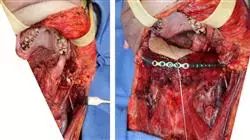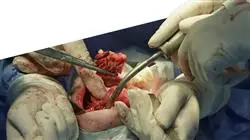University certificate
The world's largest faculty of medicine”
Introduction to the Program
A novel academic proposal, specifically dedicated to maxillofacial surgeons, which delves into the latest scientific and technological findings in this medical specialty”

This Professional master’s degree from TECH brings together in a complete and efficient way the latest scientific and technical findings in the area of Maxillofacial Surgery, delving into new technologies that provide not only a better diagnostic procedure, but also a more specific treatment tailored to the needs of each patient. It is a comprehensive program, devised by the best Maxillofacial Surgeons and designed using the latest educational technology.
Designed specifically for Maxillofacial Surgeons, and during 1,500 hours of intensive study, the program will delve into the development of new technologies such as the latest generation of scanners that have facilitated the incorporation of diagnostic and follow-up methods based on the use of 3D technology in microsurgery.
He will also delve into the latest developments in the treatment of benign and premalignant pathology of the head and neck, as well as salivary glands, dento-skeletal malocclusion and Obstructive Sleep Apnea Syndrome. In the same way, the latest scientific evidence for the approach to the pathology of the temporomandibular joint, facial traumatology and aesthetic and functional rhinoplasty will be discussed. Lastly, special emphasis will be placed on malignant head and neck tumors, as well as their reconstruction and the specifics of facial paralysis.
Everything in a convenient 100% online format that facilitates the acquisition of knowledge from wherever and whenever you want. In this way, the Maxillofacial Surgeon will be able to organize an academic experience adapted to his or her needs, without having to give up his or her professional and/or personal activities. Moreover, in the Virtual Classroom you will find hundreds of hours of additional material in different formats with which you will be able to contextualize the syllabus and inquire those aspects that you consider most important for your professional development.
With this program you will be able to delve into the latest developments in the treatment of benign and premalignant pathology of the head and neck, as well as the salivary glands”
This Professional master’s degree in Head and Neck Surgery contains the most complete and up-to-date scientific program on the market. The most important features include:
- The development of practical cases presented by experts in Head and Neck Surgery
- The graphic, schematic, and practical contents with which they are created, provide scientific and practical information on the disciplines that are essential for professional practice
- Practical exercises where self-assessment can be used to improve learning
- Its special emphasis on innovative methodologies
- Theoretical lessons, questions to the expert, debate forums on controversial topics, and individual reflection assignments
- Content that is accessible from any fixed or portable device with an Internet connection
Delve into the latest advances in Head and Neck Surgery thanks to this program, which is developed through a learning system that will be completely adapted to your personal and professional circumstances”
The program’s teaching staff includes professionals from sector who contribute their work experience to this educational program, as well as renowned specialists from leading societies and prestigious universities.
The multimedia content, developed with the latest educational technology, will provide the professional with situated and contextual learning, i.e., a simulated environment that will provide immersive education programmed to learn in real situations.
This program is designed around Problem-Based Learning, whereby the professional must try to solve the different professional practice situations that arise during the academic year For this purpose, students will be assisted by an innovative, interactive video system created by renowned and experienced experts.
Through this 100% online program, you will learn in depth the most advanced techniques for the approach to facial traumatology and aesthetic and functional rhinoplasty"

Employing the best teaching methodology in the academic world, you will learn the most up-to-date techniques in cranial vault reconstruction. in cranial vault reconstruction"
Why study at TECH?
TECH is the world’s largest online university. With an impressive catalog of more than 14,000 university programs available in 11 languages, it is positioned as a leader in employability, with a 99% job placement rate. In addition, it relies on an enormous faculty of more than 6,000 professors of the highest international renown.

Study at the world's largest online university and guarantee your professional success. The future starts at TECH”
The world’s best online university according to FORBES
The prestigious Forbes magazine, specialized in business and finance, has highlighted TECH as “the world's best online university” This is what they have recently stated in an article in their digital edition in which they echo the success story of this institution, “thanks to the academic offer it provides, the selection of its teaching staff, and an innovative learning method aimed at educating the professionals of the future”
A revolutionary study method, a cutting-edge faculty and a practical focus: the key to TECH's success.
The most complete study plans on the university scene
TECH offers the most complete study plans on the university scene, with syllabuses that cover fundamental concepts and, at the same time, the main scientific advances in their specific scientific areas. In addition, these programs are continuously being updated to guarantee students the academic vanguard and the most in-demand professional skills. In this way, the university's qualifications provide its graduates with a significant advantage to propel their careers to success.
TECH offers the most comprehensive and intensive study plans on the current university scene.
A world-class teaching staff
TECH's teaching staff is made up of more than 6,000 professors with the highest international recognition. Professors, researchers and top executives of multinational companies, including Isaiah Covington, performance coach of the Boston Celtics; Magda Romanska, principal investigator at Harvard MetaLAB; Ignacio Wistumba, chairman of the department of translational molecular pathology at MD Anderson Cancer Center; and D.W. Pine, creative director of TIME magazine, among others.
Internationally renowned experts, specialized in different branches of Health, Technology, Communication and Business, form part of the TECH faculty.
A unique learning method
TECH is the first university to use Relearning in all its programs. It is the best online learning methodology, accredited with international teaching quality certifications, provided by prestigious educational agencies. In addition, this disruptive educational model is complemented with the “Case Method”, thereby setting up a unique online teaching strategy. Innovative teaching resources are also implemented, including detailed videos, infographics and interactive summaries.
TECH combines Relearning and the Case Method in all its university programs to guarantee excellent theoretical and practical learning, studying whenever and wherever you want.
The world's largest online university
TECH is the world’s largest online university. We are the largest educational institution, with the best and widest online educational catalog, one hundred percent online and covering the vast majority of areas of knowledge. We offer a large selection of our own degrees and accredited online undergraduate and postgraduate degrees. In total, more than 14,000 university degrees, in eleven different languages, make us the largest educational largest in the world.
TECH has the world's most extensive catalog of academic and official programs, available in more than 11 languages.
Google Premier Partner
The American technology giant has awarded TECH the Google Google Premier Partner badge. This award, which is only available to 3% of the world's companies, highlights the efficient, flexible and tailored experience that this university provides to students. The recognition as a Google Premier Partner not only accredits the maximum rigor, performance and investment in TECH's digital infrastructures, but also places this university as one of the world's leading technology companies.
Google has positioned TECH in the top 3% of the world's most important technology companies by awarding it its Google Premier Partner badge.
The official online university of the NBA
TECH is the official online university of the NBA. Thanks to our agreement with the biggest league in basketball, we offer our students exclusive university programs, as well as a wide variety of educational resources focused on the business of the league and other areas of the sports industry. Each program is made up of a uniquely designed syllabus and features exceptional guest hosts: professionals with a distinguished sports background who will offer their expertise on the most relevant topics.
TECH has been selected by the NBA, the world's top basketball league, as its official online university.
The top-rated university by its students
Students have positioned TECH as the world's top-rated university on the main review websites, with a highest rating of 4.9 out of 5, obtained from more than 1,000 reviews. These results consolidate TECH as the benchmark university institution at an international level, reflecting the excellence and positive impact of its educational model.” reflecting the excellence and positive impact of its educational model.”
TECH is the world’s top-rated university by its students.
Leaders in employability
TECH has managed to become the leading university in employability. 99% of its students obtain jobs in the academic field they have studied, within one year of completing any of the university's programs. A similar number achieve immediate career enhancement. All this thanks to a study methodology that bases its effectiveness on the acquisition of practical skills, which are absolutely necessary for professional development.
99% of TECH graduates find a job within a year of completing their studies.
Professional Master's Degree in Head and Neck Surgery
The TECH Professional Master's Degree in Head and Neck Surgery is a unique opportunity to specialize in one of the most complex areas of medicine. Through this postgraduate program, health professionals will be able to develop advanced technical skills and acquire specialized knowledge in the diagnosis and treatment of head and neck pathologies. In addition, TECH offers an online modality that allows students to access the content from anywhere and at any time, giving them the flexibility to continue with their professional and personal responsibilities while studying.







